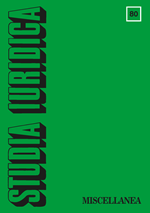Government Acting on Itself: Hungarian Cabinet in the Interwar Period
Government Acting on Itself: Hungarian Cabinet in the Interwar Period
Author(s): Gábor BathóSubject(s): Politics / Political Sciences, History, Political Sciences, Public Administration
Published by: Wydawnictwa Uniwersytetu Warszawskiego
Keywords: ministerial structure; World War I; government; ministry; struktura minsterstw; I wojna światowa; rząd; ministerstwa
Summary/Abstract: Act XI of 1917 gave the opportunity to the Hungarian government to increase the number of the government members with four ministers without portfolio. This was meant to be a temporary opportunity almost at the end of World War I. The act declared that four ministers without portfolio may be appointed “for the time of the war and the transition to peace”. The determination of the temporal effect seems to be inaccurate and loose. Especially this characteristic gave the base of my paper. In my paper, I am showing the expressed reasons for such a regulation, and the original interpretation of the act and the practice based on it. According to the Hungarian constitutional tradition, an act was the only tool to change the ministerial structure of the government, and changing ministries and competencies could only be done by acts. Later the practice changed, which meant the contemporaneous change in the interpretation of Act XI of 1917 as well. These mutual effects lead to a situation in which it was totally acceptable to appoint a minister without portfolio in 1944 legally based on an act that was meant to solve the extraordinary questions of World War I.
Journal: Studia Iuridica
- Issue Year: 2019
- Issue No: 80
- Page Range: 29-37
- Page Count: 9
- Language: English

